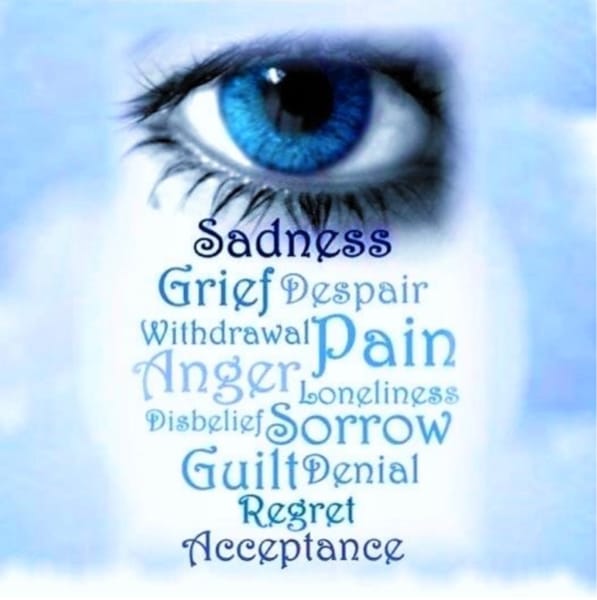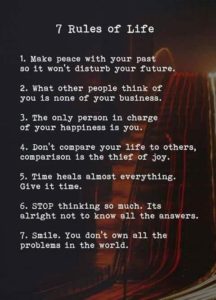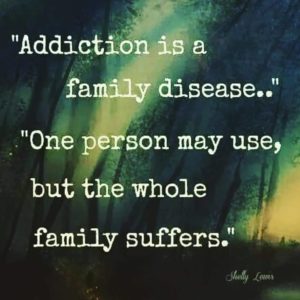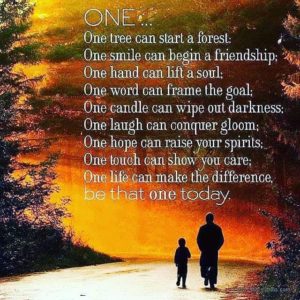



We
all wear ‘masks’ in everyday life. Some of the reasons for wearing a
mask can be: to cope, to fit in, to protect ourselves, to be acceptable
in our family/social circle, to feel safe, to be loved, to avoid being
hit or scolded or shamed. We have also different types of masks e.g.
angry mask, people-pleaser mask, avoidance mask, happy mask, functional mask.
Each of our masks has 3 layers: false positive (we are “looking good” –
most external); false negative (we “gotta hide” – middle); true self
(this is “pure me” – core). Content-less is the key here. I have a mask
but I am not my mask. I have a story and I am more than my story. I have
thoughts, feelings, history, desire, conflicts, beliefs, habits (good
and bad) and that is not the whole of me.
As we take off our
first layer of masks (false positive) we begin to create the possibility
of intimacy. We begin to show ourselves, beyond the good-looking masks
and into the darker masks: rage, control, prejudice, greed, fear, doubt,
longing (false negative). True Self – here is where we are authentic,
unique, and soulful. Here we are not limited by story nor defined by
life’s experiences, circumstances or other people! In this place where
we are what we are looking for, lies a peacefulness and acceptance of
our Selves, for who we are deeply.
Taking off the mask can be a
very scary process but only then you will be able to re-claim your
authentic, beautiful, unique self and give yourself a change to connect
with other on a deeper level.

“The
shadow is that hidden, repressed, for the most part inferior and
guilt-laden personality whose ultimate ramifications reach back into the
realm of our animal ancestors and so comprise the whole historical
aspect of the unconscious’’ (Jung, 1963). The shadow is a primordial
part of our human inheritance, which, try as we might, can never be
eluded. The pervasive Freudian defense mechanism known
as projection is how most people deny their shadow, unconsciously
casting it onto others so as to avoid confronting it in oneself. Such
projection of the shadow is engaged in not only by individuals but
groups, cults, religions, and entire countries, and commonly occurs
during wars and other contentious conflicts.
Coming to terms
with the shadow and constructively accepting and assimilating it into
the conscious personality is central to the process to become authentic
and achieve integrity.

Bereavement
is the state of loss when someone close to you has died. The death of
someone you love is one of the greatest sorrows that can occur. Feelings
of bereavement can also accompany other losses, such as the decline of
your health or the health of someone you care about, or the end of an
important relationship. Grief is a normal, healthy response to loss.
Everyone feels grief in his or her own way, but there are certain
stages to the process of mourning. It starts with recognizing a loss and
continues until that loss is eventually accepted. People’s responses to
grief will vary depending upon the circumstances of the death.
A wide and confusing range of emotions may be experienced after a loss.
There can be five stages of grief. These reactions might not occur in a
specific order, and can (at times) occur together. Not everyone
experiences all of these emotions:
– Denial, disbelief, numbness
– Anger, blame
– Bargaining (for instance, “If I am cured of this cancer, I will never smoke again”)
– Depressed mood, sadness, and crying
– Acceptance, coming to terms
Losing someone is extremely difficult so, please, remember – you don’t
need to go through this on your own. Be kind to yourself and be open to
receive support, warmth, care from others in regards to recover.
 Self-care is any activity that we do deliberately in order to take care of our mental, emotional, and physical health. Although it’s a simple concept in theory, it’s something we very often overlook. Good self-care is key to improved mood and reduced anxiety. It’s also key to a good relationship with oneself and others.
Self-care is any activity that we do deliberately in order to take care of our mental, emotional, and physical health. Although it’s a simple concept in theory, it’s something we very often overlook. Good self-care is key to improved mood and reduced anxiety. It’s also key to a good relationship with oneself and others.
Self-care isn’t a selfish act either. It is not only about considering our needs; it is rather about knowing what we need to do in order to take care of ourselves, being subsequently, able to take care of others as well. That is, if I don’t take enough care of myself, I won’t be in the place to give to my loved ones either.
Offer yourself the same treatment as you are offering to others: be kind, understanding, supportive, loving, carrying, empathetic – you deserve it.
Did you suffered from any trauma in you life? Do you feel stuck in your past because of it? One of the forms to deal with trauma can be Somatic Experiencing. Somatic Experiencing (SE) employs the awareness of body sensation to help people ”renegotiate” and heal their traumas rather than relive them. With appropriate guidance with the body’s instinctive ”felt sense,” individuals are able to access their own built-in immunity to trauma, allowing the highly aroused survival energies to be safely and gradually discharged. When these energies are discharged, people frequently experience a dramatic reduction in or disappearance of their traumatic symptoms.
Allow yourself to experience your traumatic memories from safe “here and now” platform and renegotiate it. SE can help you to move on and leave your trauma in place where it belongs – in your past. Perhaps, it is time to stop allowing your trauma to define you and discover new self.



We hear a lot about the importanceof forgiving those who have harmed us, but what about forgiving ourselves? Is that important as well? I believe that it is.
When we harm someone it is normal and healthy to feel bad about it, to experience regret and to wish we could take it back or do something to make the person feel better. What isn’t healthy is to continually beat ourselves up for our offense and to determine we are a bad person because of it. The first experience is generally thought of as guilt, while the second is considered to be shame. Shame and guilt can feel very similar—with both experiences we feel bad about ourselves. But guilt can be understood as feeling disappointed in oneself for violating an important internal value or code of behavior. Feeling guilty can be a healthy thing: it can open doors leading to positive behavior change. With shame one can also feel a disappointment in one self but no value has been violated. Shame is incredibly unhealthy, causing lowered self-esteem (feelings of unworthiness) and behavior that reinforces that self-image. As we are learning more and more, shame can be an extremely debilitating emotion.
I believe that self-forgiveness is the most powerful step you can take to rid yourself of debilitating shame. This is particularly true for those who have been abused, but it applies to everyone. Self-forgiveness is not only recommended but absolutely essential if we wish to become emotionally healthy and have peace of mind.
“Too many peo ple confuse real magic with magical thinking. Real magic isn’t a trick and it transforms our lives. Magical thinking is denial. Real magic is what happens when we break old belief patterns and have the courage to employ the native laws of the Universe” (J. Nordby)
ple confuse real magic with magical thinking. Real magic isn’t a trick and it transforms our lives. Magical thinking is denial. Real magic is what happens when we break old belief patterns and have the courage to employ the native laws of the Universe” (J. Nordby)
Have a courage to change yourself and your life – you can make it happen 💚
When a family member struggles with active addiction, he or she usually under-functions and behaves irresponsibly. This, too, sha pes the behavior of other family members. They typically respond by becoming more controlling and overly responsible. Whenever a family member struggles with any serious ongoing condition, everyone in the family is significantly affected. The equilibrium or balance of the family system shifts as each member changes and adjusts accordingly. These changes usually occur incrementally, subtly, and unconsciously.
pes the behavior of other family members. They typically respond by becoming more controlling and overly responsible. Whenever a family member struggles with any serious ongoing condition, everyone in the family is significantly affected. The equilibrium or balance of the family system shifts as each member changes and adjusts accordingly. These changes usually occur incrementally, subtly, and unconsciously.
The havoc active addiction creates in families and relationships stresses everyone in these “systems”—parents, children, siblings, spouses, partners, close friends, etc. Active addiction destabilizes the home environment, disrupts family life and muddling relationships, and often compromises finances, as well as mental, emotional, and physical health. Without assistance and unless family members and significant others learn and practice how to do things differently, these effects can be chronic and long-term.
 “…we accept responsibility for our problems and see that we’re equally responsible for our solutions.”
“…we accept responsibility for our problems and see that we’re equally responsible for our solutions.”
Basic Text, p. 97
Some of us, well accustomed to leaving our personal responsibilities to others, may attempt the same behavior in recovery. We quickly find out it doesn’t work.
For instance, we are considering making a change in our lives, so we call our sponsor and ask what we should do. Under the guise of seeking direction, we are actually asking our sponsor to assume responsibility for making decisions about our life. Or maybe we’ve been short with someone at a meeting, so we ask that person’s best friend to make our apologies for us. Perhaps we’ve imposed on a friend several times in the last month to cover our service commitment. Could it be that we’ve asked a friend to analyze our behavior and identify our shortcomings, rather than taking our own personal inventory?
Recovery is something that has to be worked for. It isn’t going to be handed to us on a silver platter, nor can we expect our friends or our sponsor to be responsible for the work we must do ourselves. We recover by making our own decisions, doing our own service, and working our own steps. By doing it for ourselves, we receive the rewards.
Just for Today: I will accept responsibility for my life and my recovery
